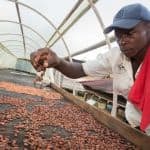Before the Handshake: How to Make Corporate-Social Enterprise Partnerships Work
This article was adapted from a webinar hosted by the Corporate Partnerships Learning Lab at the Aspen Network for Development Entrepreneurs in early 2018.
In theory, value chain partnerships between corporations and small and growing enterprises or entrepreneurs are beneficial for all: Corporations can reap financial rewards while effecting positive social and economic benefits for low-income and rural communities.
In practice, however, these partnerships can have mixed results. At the Clinton Giustra Enterprise Partnership (CGEP) and Intellecap, we’ve faced challenges and learned valuable lessons when trying to build viable business relationships among corporations and smallholder farmers, aggregators like cooperatives and farmer producer companies (FPCs), and processors. In this article, we address the most common questions from organizations hoping to create similar partnerships.
How do corporations benefit from working with social enterprises and entrepreneurs?
Corporations — ranging from multinational companies to supermarkets to food manufacturers — have increased and expanded their sustainability and corporate social responsibility (CSR) commitments in response to growing pressure from customers, shareholders, employees and other stakeholders.
When sourcing for supply chains, corporations can turn to low-income communities (either directly or indirectly) to fulfill their supply requirements. In developing countries, social entrepreneurs and enterprises often grow crops such as cocoa, palm oil or coffee, and they are therefore the best partners for corporations to source materials for their supply chain needs.
What role can “intermediary/translator” organizations such as CGEP and Intellecap play?
Connecting corporations directly to the enterprises isn’t always easy, which is where intermediary or “translator” organizations play a key role in this relationship. These intermediary organizations bridge the operational, commercial and cultural gaps between corporations and low-income communities, as well as establishing controls and processes that add the traceability and reliability needed in commercial transactions. In the case of smallholder agriculture, these intermediaries provide farmers with the technical assistance needed to improve yields and quality to match national/international corporate standards and reduce the risk for corporations when sourcing from small-scale farmers.
CGEP is one such intermediary, and its goal is to improve farmer incomes to help them rise above and stay out of poverty. CGEP builds agribusinesses to address market needs and connect farmers, corporations, local retailers, fast food chains and other high-value markets. For example, its agribusinesses provide technical assistance and supply inputs, like seeds and fertilizer, on credit to help increase farmer production and quality to meet the standard of high-value markets. CGEP’s businesses then purchase and aggregate the products and sell them directly to buyers, as well as managing the logistics.
Similarly, Intellecap works with different value chain actors to design business models and partnership structures that benefit both corporations and producers. For instance, in Southwestern Bangladesh it developed a business model for two “village supermarkets” — local trading hubs for outputs and inputs — to improve the black tiger shrimp value chain. After a thorough analysis, the recommended business model involved aggregating demand for high-quality inputs to be supplied to shrimp farmers at a reasonable cost and in a timely manner. Not only did shrimp production significantly increase alongside incomes for farmers, but corporate shrimp exporters also sourced larger quantities of shrimp than before the new business model.
How do enterprises and other organizations benefit from corporate partnerships?
Corporations are often the main buyers of crops such as grains, maize, cotton and certain nuts. By working with them, enterprises secure a minimum level of demand for these crops and increase the possibility of achieving scale. Successful partnerships also lead to higher success rates for replicating a similar model in new regions.
Working with corporations can reduce risks for farmers because the corporation guarantees to purchase set quantities of the farmers’ current and/or future production. This makes a value chain more attractive to investors.
Tapping into corporate commercial know-how and market intelligence can greatly benefit social enterprises and entrepreneurs, with multiple opportunities for shared resources in areas such as logistics. For example, in El Salvador, CGEP’s agribusiness and its main client, Super Selectos supermarkets, use the same logistics company for transport and warehousing of fruits and vegetables, creating logistics synergies and cost savings.
In some cases, CSR budgets have corporate funding available, but this funding is often limited, and in supply chain sourcing scenarios, organizations should be wary if there is no long-term procurement commitment.
How do you set corporate expectations about working with small farmers or producers while retaining them as a partner?
Corporations often benchmark among large, mature and highly efficient partners. This translates to high expectations in the areas of quality, pricing, volumes and timeframes. At the same time, working with small farmers or producers inherently involves greater challenges and risks. Ensure that potential corporate partners understand the risks and have realistic expectations. To avoid wasted time, discuss commercial terms (especially price) and timelines early in the process to adequately allow for quality and quantity improvements. Aligning social goals and ensuring that both parties understand what the goals are make this process easier. Transparency on prices paid to farmers facilitates pricing discussions with corporate partners.
It is important that corporations understand that the smallholder farmer cooperatives or associations they are sourcing from need time to achieve the quality specifications demanded, and that they need to be ready with a plan B in case the cooperative falters on its quality or volume. Civil society organizations can play a role in overseeing the relationship and ensuring that promises are kept.
what are some effective financing mechanisms for testing and incubating corporate-enterprise partnerships?
Ideally, costs would be fairly allocated between partners. This can be done in various ways, such as corporations covering the costs of the tests that were directly conducted for their own benefit on a “fee-for-service” basis. Another option is for corporations to subsidize the costs of things like inputs and machinery.
An overlooked area is the high working capital requirement of dealing with certain crops in large quantities. This includes the cost of preparing the soil, supplying new seeds and purchasing or renting machinery to till the land or thresh crops. Farmers need to be paid on time, as their livelihoods depend on it. Discuss options for working capital financing with corporate partners, which can include direct financing or favorable and timely payment terms to reduce the burden on intermediary organizations.
When supplying machinery or farm equipment like drip irrigation systems, if the corporation selling the equipment offers innovative financial products to the farmer aggregators or intermediaries, then the smallholder farmers can purchase the equipment and the repayment of the loan is deducted at the source by the aggregating organization.
What lessons have you learned about building the business case for a large company to work with small-scale partners?
- Engage with the right people and get buy-in from all levels within a company, especially the procurement team for sustainable sourcing, and determine which teams drive decision-making. The sustainability, partnerships or CSR teams may be responsible for setting strategies, but may not be the final decision makers for trading and procurement. Find out if there is real buy-in from commercial teams. And remember that people change often!
- Ask how a corporation defines “impact” or “sustainability.” Are they interested in driving impact at the lowest level? If they are truly interested in working with low-income populations, what are their commercial and social goals? Their goals and yours should be aligned.
- Find out how a corporation keeps itself responsible for meeting its sustainability or social targets. Is there any recourse if they don’t?
- In sourcing commitments, establish the price, quantity and quality a corporation requires. Working with low-income populations involves low margins, so intermediaries need to work out whether they can pass on a sufficient margin to producers in a way that increases their incomes or positively impacts their lives in another meaningful way. Also, find out the corporations’ quantity and quality requirements and what the repercussions would be if they are not met.
- Understand what services the corporation is willing to provide, if any, to support small producers to meet their desired specifications. Extension support is often needed and should be offered by the corporation if specifications are over and above what farmers are currently producing.
We believe that corporate-enterprise partnerships are important for transforming small-scale agriculture and other sectors. We also believe it is important to guide and enable corporations to fulfill their social commitments. This includes having real “skin in the game,” without corporations relying on funding from enterprises, governments and aid agencies to accomplish these commitments. While there is no one-size-fits-all solution, we continue to seek out the best ways to work with new and existing corporate partners, and we look forward to continued dialogue on the topic.
James Jenkin is the chief executive officer of the Clinton Giustra Enterprise Partnership (CGEP), an initiative of the Clinton Foundation.
Lindsay Clinton is a director with Intellecap and co-chair of the ANDE Corporate Partnerships Learning Lab.
Photo credit: Jayne Quan, Clinton Foundation
- Categories
- Agriculture, Social Enterprise



